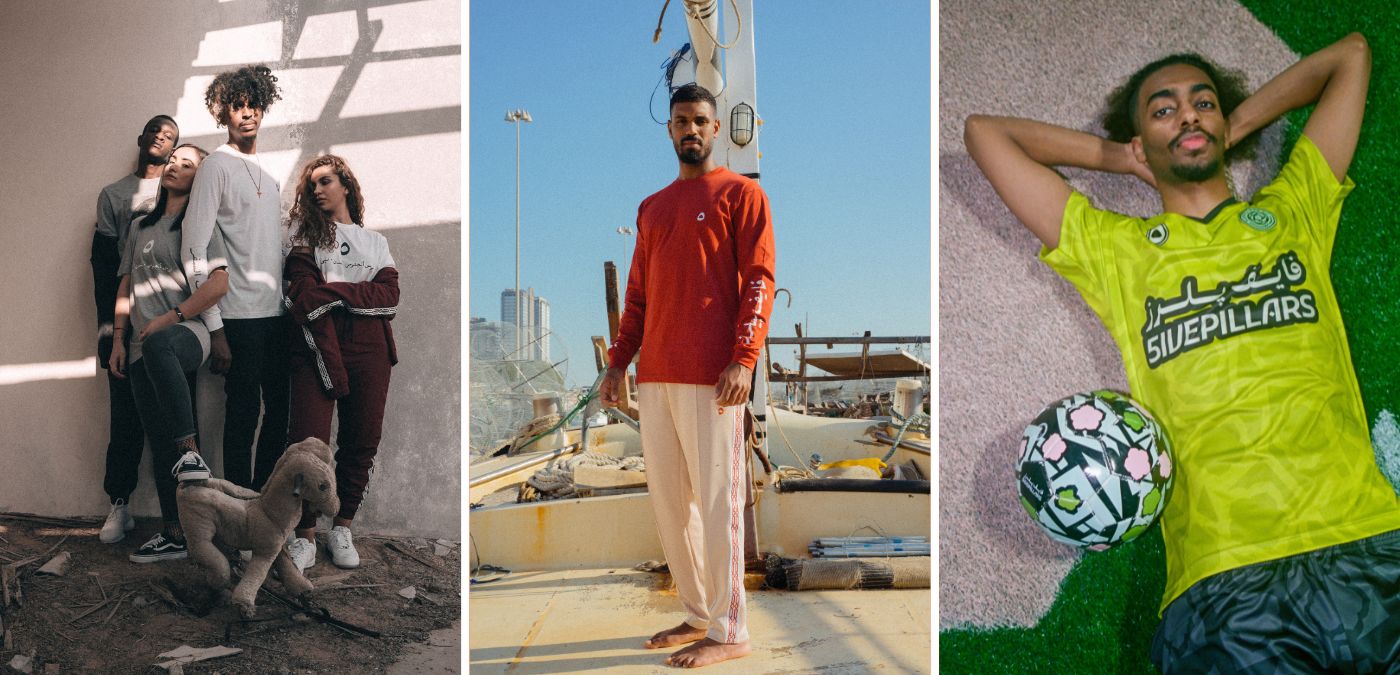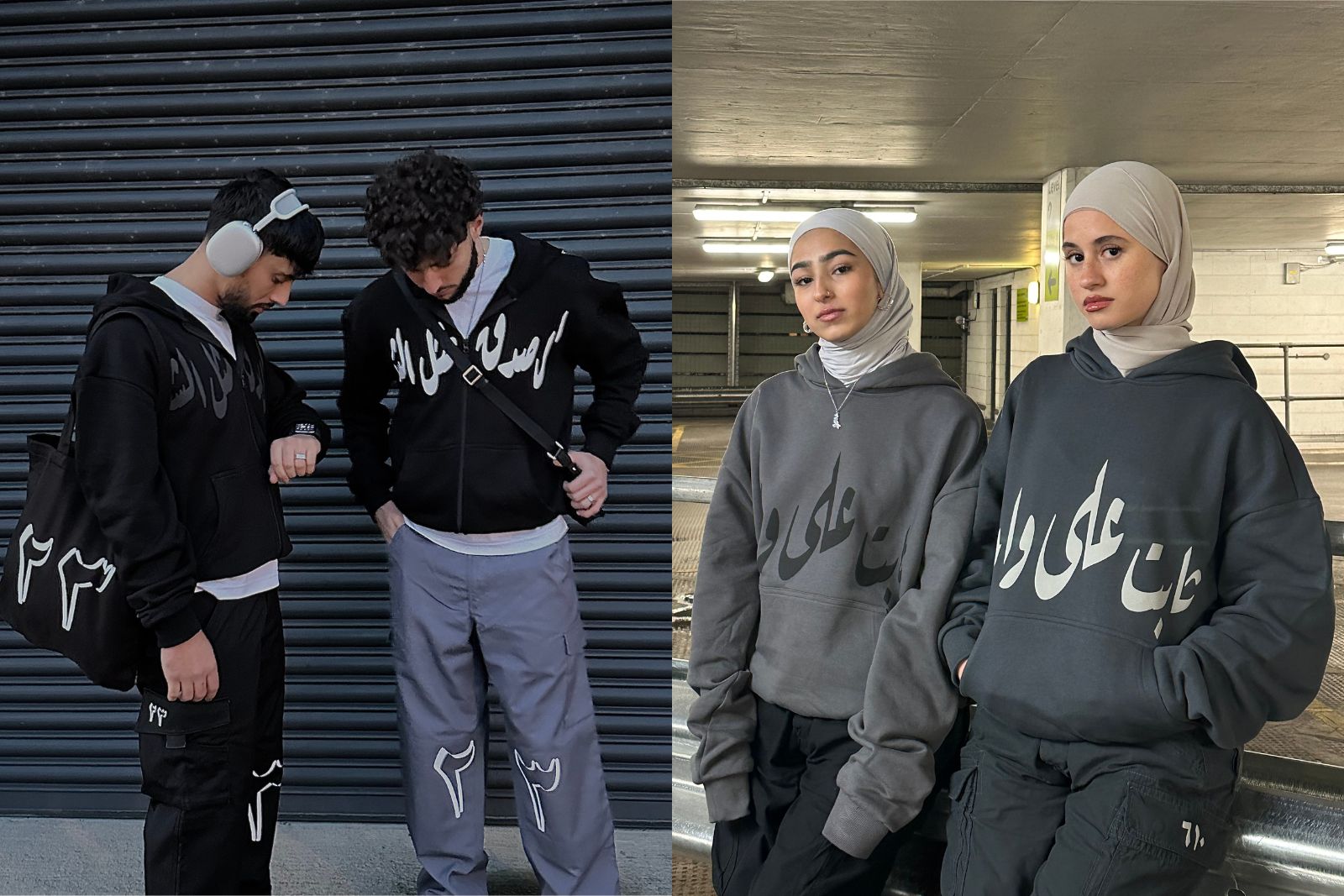The Muslim streetwear brands reclaiming Quranic Arabic
Arabic text has long been appropriated by mainstream fashion labels. Now Muslim designers are combining modern streetwear with age-old Islamic wisdom
–

Earlier this year Farrukh Ershad, the creative director of fashion label 5ive Pillars was at a branch of Trader Joe’s, a US-grocery store chain, wearing an oversized cotton T-shirt from his latest collection featuring a sketch of flowers in various stages of bloom and a farmhouse in the distance. Beneath, in bold font, were the words: “The world is a field for cultivating the afterlife.”
While Ershad paid for his shopping, the cashier asked him what it meant. “We had a conversation about where that quote comes from, Islamically, and about the ethos of doing good for the sake of God and finding your reward with him,” he says.
Ershad, from Sacramento, California, launched 5ive Pillars in 2014. “I wanted to create a brand that conveys the themes and messaging of Islam, to give people something that they can wear and rock,” he says.
More importantly, though, he wanted his brand to promote a core tenet of Islam — that anyone who wore 5ive Pillars would feel that they were part of the global ummah. Since its founding, the brand has grown into a globally recognised, Islam-infused streetwear label worn by athletes such as the Boston Celtics basketball player Jaylen Brown and the Dagestani UFC champion Khabib Nurmagomedov.
One of the brand’s recent collections was designed in tribute to Malcom X, in collaboration with his daughter Qubilah Shabazz. In bold, red Arabic script a black, crewneck shirt features the name he took upon converting to Sunni Islam: El Hajj Malik El Shabazz.
Past pieces feature phrases such as “Alhamdullilah for everything” and “Medina is for lovers”. One of Ershad’s most popular graphics is the Arabic word “hub”, meaning “love”, embroidered on its signature range of single-colour tracksuits and caps.
“There are certain things that can only be expressed in the language that they come from, like Arabic, which has so much depth and beauty,” says Ershad. “For us, because the Qur’an was revealed in Arabic and it’s the language of the prophet, it’s the language we roll with.”
Arabic calligraphy has a long history in fashion, utilised by both Arab and non-Arab designers. As far back as 1993, Chanel created evening gowns with Arabic script featuring on tight-fitting bustiers. Those creations stirred controversy among Muslim communities, ultimately causing the dresses to be removed from the collection.
Some people might frown at designers emblazoning clothing with religious statements in Arabic, but it’s a practice with deep roots in jewellery design. Muslims have long been wearing gold pendants and bangles engraved with Quranic verses such as the Ayatul Kursi for centuries, with some of the earliest Islamic jewellery dating back to 1000 AD. Following this tradition, contemporary jewellery brands including Nominal and Zudo have also used passages from the Qur’an in their collections.
For Muslim-owned fashion labels, the use of the Arabic language, calligraphy and references to Islamic spirituality are deeply personal and sincere. The Nottingham-based streetwear brand Zidouri, started in 2016 by Youssef Zidouri, features Quranic quotes and hadiths in its unisex designs. On one of its newest T-shirts black Arabic text printed in a circular pattern reads: “Do not be amazed by the beauty of this world” — an original design inspired by reminders from the Qur’an not to get lost in worldly matters, and to prioritise God. The label launched by offering a bespoke service of printing and embroidering customers’ names or numbers denoting their favourite Qur’anic verses in Arabic on sweatshirts and tees.
“It blew us up at the time,” says Zidouri. “I felt like we couldn’t really express our identity as Muslims and, even if we did, it would be really corny stuff or wearing thobes. We just wanted to create something that represented us.”
Zidouri believes that there are spiritual benefits to wearing clothing bearing Islamic messages, such as his recent hoodie design featuring a phrase taken directly from the Qur’an: “No life without prayer.”
“I do think you receive good deeds if somebody sees the message on the clothing and it inspires them.”
Both Zidouri and Ershad are united in their aim to create wearable conversation-starters for customers in non-Muslim-majority countries. “Even people who are not Muslims look at Zidouri and say, ‘This stuff is really cool’,” Zidouri says.
Ershad adds that 5ive Pillars has also attracted the interest of some non-Muslims, who have then embarked on their own journeys to learn more about the teachings of the prophet Muhammad.
“I can say for certain that I know at least one person who has accepted Islam because of the brand opening up their world view to the faith,” he says.
While Chanel caused quite the controversy back in 1993, the lines are more blurred 30 years later, allowing a number of non-Arab designers to be openly inspired by Arab culture. The French designer Marine Serre is known for using Islamic symbols such as crescent moons on her creations, as well as sending models down the runway in niqab-like face veils.
Other brands, such as Cecilie Copenhagen, sell clothing that features the distinctive Palestinian keffiyeh scarf pattern in contemporary colours and cuts. To avoid being accused of cultural appropriation, brands often — but not always — collaborate with representatives from relevant communities to help create and market their clothing.
Ershad believes it’s fine for western designers to use Arabic script if they show a clear appreciation of the language, but warns that doing so simply to appear cool can come across as superficial.
“When it isn’t part of their brand identity and is used as a gimmick it’s kind of annoying,” agrees Zidouri.

Both designers mention the US skateboarding lifestyle brand Supreme, which has used an Arabic version of its logo on T-shirts, sweatshirts and caps. Ershad points out that one positive outcome may be that such designs can introduce the beauty of the Arabic script to people unfamiliar with the language.
Celebrating identity, enhancing spirituality, inspiring people to reconnect with or learn about Islam from scratch, are principles at the core of both 5ive Pillars and Zidouri. But, as Zidouri says, there’s a fine line between promoting your religion and “stunting”.
Intention is important when embodying faith-based fashion, says Ershad: “If wearing a specific type of clothing or attire makes you feel pious and boosts your own ego to make yourself feel like you’re holier than thou for others, then you’re probably not doing it right, as far as your spirituality goes.”
Topics
Get the Hyphen weekly
Subscribe to Hyphen’s weekly round-up for insightful reportage, commentary and the latest arts and lifestyle coverage, from across the UK and Europe
